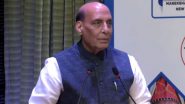New Delhi, Jan 10 (PTI) Swamy Shraddananda, jailed for 30 years for killing his wife, has moved the Supreme Court seeking authorities to decide his mercy plea before the President in December, 2023.
When the petition came up for hearing before a bench of Justices B R Gavai and Augustine George Masih on Friday, the bench told advocate Varun Thakur, appearing for 84-year-old Shraddananda alias Murali Manohar Mishra, to provide a copy of his plea to the Centre's counsel.
Also Read | Supreme Court Tells BMC: 'No Tree Felling In Mumbai's Aarey Without Our Nod'.
It said the plea would be heard next week.
Thakur said Shraddananda had spent 30 years in jail without even a day's parole.
In October last year, the apex court refused to entertain Shraddananda's plea seeking a review of the top court's verdict directing him not to be released from prison for the rest of his life.
Shraddananda, whose wife was the grand-daughter of a former dewan of the princely state of Mysore, had sought a review of the July 2008 verdict of a three-judge bench of the apex court.
Shakereh, the wife of Shraddananda, was the granddaughter of Sir Mirza Ismail, a former dewan of the erstwhile princely state of Mysore.
The couple married in April, 1986, but Shakereh suddenly disappeared in May 1991, the apex court noted in its July 2008 verdict.
It said in March 1994, the central crime branch, Bengaluru, took over the investigation on the "missing" complaint regarding Shakereh and Shraddananda confessed to having killed her.
In his fresh plea filed in the apex court, Shraddananda referred to the assassination case of former prime minister Rajiv Gandhi and said the convicts got parole and furlough during the incarceration and were eventually freed after 27 years of imprisonment.
The plea referred to the October 23 last year order passed by the apex court on Shraddananda's review petition.
It said the top court had noted in its order that a Constitution bench held the exercise of powers by the President under Article 72 and by the Governor under Article 161 were available despite the court imposing a sentence of life up to death as a substitute for death penalty.
Articles 72 and 161 of the Constitution deal with the power of the President and the Governor to grant pardons, etc., and to suspend, remit or commute sentences in certain cases.
Shraddananda said he filed a mercy petition before the President in December 2023, which was pending for consideration.
"The petitioner is in jail since 30 years without single day parole or without any remission," the plea said, "and the petitioner was suffering with multiple diseases."
It sought a direction to the respondent authorities to decide his mercy petition.
A trial court in 2005 convicted Shraddananda and sentenced him to death following which the Karnataka High Court in September the same year confirmed the conviction and the death sentence.
His appeal against the high court order came up before a two-judge bench of the apex court, which unanimously upheld his conviction but differed on sentencing.
While one of the judges said he should not be released from prison till the end of his life, the other judge said he deserved nothing but death.
The matter then came up before a three-judge bench which delivered its verdict on July 22, 2008.
"We accordingly substitute the death sentence given to the appellant by the trial court and confirmed by the high court by imprisonment for life and direct that he shall not be released from prison till the rest of his life," the bench said.
(This is an unedited and auto-generated story from Syndicated News feed, LatestLY Staff may not have modified or edited the content body)













 Quickly
Quickly


















